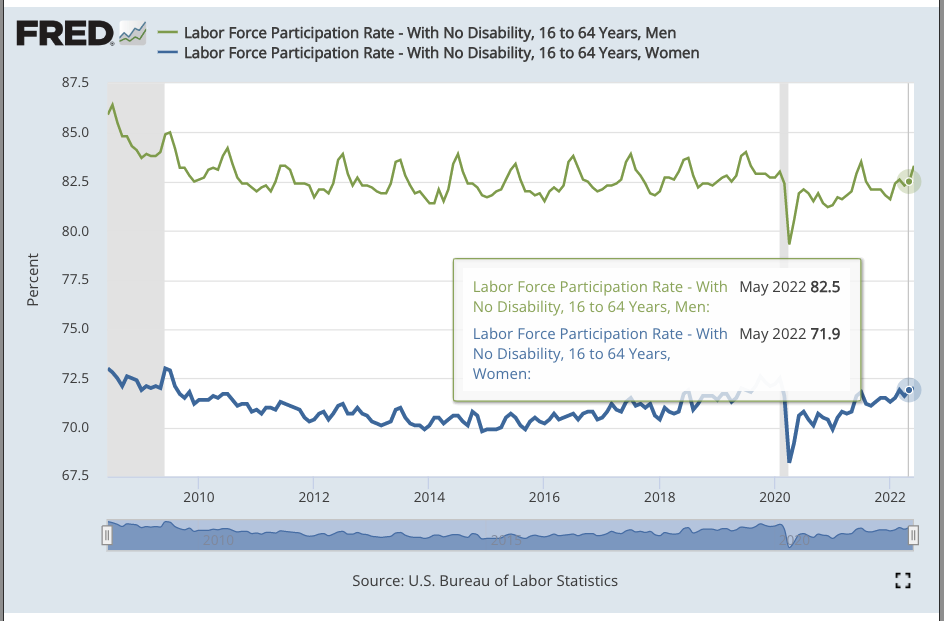A leading globalist magazine is lamenting labor migration is now the untouchable “Third Rail” of American politics, even as it demands more migrants to replace Americans who have fallen out of the workforce.
“A shortfall in immigration has become an economic problem for America,” said The Economist‘s headline on the July 28 editorial. The “shortfall in the population is already making it harder for companies to find workers,” the London-based publication said, adding:
Employers in the restaurant and accommodation sector, which draws a quarter of its employees from the foreign-born population, could not fill about 15% of job openings last year.
In professional and business services, where the foreign-born make up a fifth of workers, doing everything from architectural sketches to tax preparation, roughly 10% of jobs went unfilled last year. That, in turn, may be contributing to higher wages, with pay rising especially quickly for low-income earners.
But immigration is now the untouchable “Third Rail” of U.S. politics, so Congress will not increase the pipeline of foreign labor into U.S. jobs, the editorial complained.
“We have tools available to us to resolve labor issues that we don’t appear willing to use,” Marianne Wanamaker, an investor and a former economic advisor to President Donald Trump, told the magazine. “That is the result of years and years of making immigration a third rail of American politics,” she lamented.
The ‘Third Rail” refers to the electricity-carrying rail that sits between the two rails of underground subways.
Public opposition has already killed several bills in 2022 that were intended to accelerate the extraction migration of workers from poor countries.
But Democrats are still trying, and have hidden immigration giveaways to investors in their draft spending bills for 2023.
“Lawmakers working to lift green card caps for STEM immigrants haven’t given up … [and] they’re now hoping to shoehorn the provision into the Senate’s defense bill instead, and have tapped Republican Sen. Thom Tillis of North Carolina as their champion in the upper chamber,” Politico reported July 31.
Public opposition is deterring GOP legislators from backing the migration bills, according to Politico. “After helping broker a deal on gun control legislation in June, Cornyn was attacked by Breitbart and others … for telling a Democratic colleague immigration would be next,” Politico noted.
Business demands for more migration are usually presented as a good policy fix for a claimed “shortage” of workers.
But the economy already has roughly 163 million workers. This huge population in a free-market economy ensures that CEOs are free to hire workers away from other, less successful companies, usually with offers of higher wages.
Moreover, The Economist and other pro-migration groups ignore the reality that millions of Americans have been pushed out of the labor force by government policy since 1990 — and can be pulled back to jobs by a change in government policy.
In early 2008, 86.4 percent of American men aged 16 to 64 were working. By June 2022, just 82.5 percent of those men were working.
That huge 4-point loss from 2008 to 2022 adds up to 4 million working-age absent Americans.
These 4 million absent men are not even recorded in the unemployment rolls. Some have enrolled in college, but many have given up looking for jobs. This means they are not counted in the government’s unemployment numbers, which only record men who have looked for jobs in recent weeks.
The Center for Immigration Studies reported on July 11:
Among prime-age men (25-54), who traditionally have the highest rates of work, labor force participation among those without a bachelor’s was lower in 2022 than in 2000 in 49 states plus D.C. The decline averaged 5.2 percentage points.
“We have a huge unemployment problem, but they’re not counted” in government data, said Jeffrey Sachs, a San Francisco investor said in a July interview:
The government-run migrant inflows have also pushed many additional Americans out of more skilled and better-paid jobs. A 2021 study by the Census Bureau reported:
The vast majority (62%) of [American] college-educated workers who majored in a STEM [science, technology, engineering and math] field were employed in non-STEM fields such as non-STEM management, law, education, social work, accounting or counseling. In addition, 10% of STEM college graduates worked in STEM-related occupations such as health care.
The path to STEM jobs for non-STEM majors was narrow. Only a few STEM-related majors (7%) and non-STEM majors (6%) ultimately ended up in STEM occupations.
Democrats and Republicans are facing more pressure from business interests who want to further cut employees’ wages amid Joe Biden’s inflation.
The wage cuts also recognized by The Economist are being touted by employers as a fix for inflation. That recognition is a notable change — before 2021, media outlets generally echoed employers’ claims that migration did not cut wages or skew the labor market away from employees.
This demand for more migration was pushed by the editors of the German-owned Politico website, with a July 31 article about the industry’s calls for imported white-collar workers:
In late July, nine major chip companies planned to send an open letter to congressional leadership warning that the shortage of high-skilled STEM workers “has truly never been more acute” and urging lawmakers to “enact much-needed green card reforms.” But the letter was pulled at the last minute, after some companies worried about wading into a tense immigration debate at the wrong time.
Democratic activists are eagerly protecting the investor class by portraying the mainstream opposition to corporate-driven replacement migration as a racist conspiracy theory.
“We’re still not reckoning with the degree to which great replacement theory is all about the defense of whiteness,” said a May 24 article in The Washington Post:
The smokescreen here works as follows: Republicans say Democrats are plotting to change the demographics of the country. Yet America has always changed demographically. And Republicans cannot say with any certainty that demographic change will primarily benefit Democrats over the long term, given all the talk about the Latino shift to the GOP.
And so Republicans have gotten away with avoiding the clear implications of their argument. If more immigrants come, what precisely is the threat their audiences are supposed to fear? What will be lost?
Numerous reports show the huge economic damage done to average Americans — and American blacks and Latinos — by legal and illegal migration.
Like the authors of the Washington Post article, the donor-dominated side of the GOP also downplays the economic damage caused by the government’s pipelines of legal and illegal migrants.
On July 29, the House GOP leadership released a brief and vague two-page policy platform on border security for the 2022 election which sidelines the economic impact of legal and illegal migration. Titled “House Republicans: We Must Secure the Southern Border,” the paper focuses attention on illegal migration and ignores government-run pipelines of labor to employers.
These pipelines are increasingly unpopular among Americans, even though they are rarely discussed by the establishment media. “Our legislators seem committed to betting on foreign workers rather than developing a talent pipeline of native-born Americans,” trainer Pamela Denise Long wrote in a July 29 op-ed for Newsweek.com. “Why don’t our dreams matter?” she asked.
Extraction Migration
Since at least 1990, the D.C. establishment has extracted tens of millions of legal and illegal migrants —plus temporary visa workers — from poor countries to serve as workers, managers, consumers, and renters for various U.S. investors and CEOs.
This federal economic policy of Extraction Migration has skewed the free market in the United States by inflating the labor supply for the benefit of employers.
The inflationary policy makes it difficult for ordinary Americans to get married, advance in their careers, or raise families, or buy homes.
Extraction migration has also slowed innovation and shrunk Americans’ productivity, partly because it allows employers to boost stock prices by using cheap stoop labor instead of productivity-boosting technology.
Migration undermines employees’ workplace rights, and it widens the regional wealth gaps between the Democrats’ big coastal states and the Republicans’ heartland and southern states. The flood of cheap labor tilts the economy towards low-productivity jobs and has shoved at least ten million American men out of the labor force.
An economy built on extraction migration also drains Americans’ political clout over elites, alienates young people, and radicalizes Americans’ democratic civic culture because it allows wealthy elites to ignore despairing Americans at the bottom of society.
The economic policy is backed by progressives who wish to transform the U.S. from a society governed by European-origin civic culture into a progressive-directed empire of competitive, resentful identity groups. “We’re trying to become the first multiracial, multi-ethnic superpower in the world,” Rep. Rohit Khanna (D-CA) told the New York Times in March 2022. “It will be an extraordinary achievement … we will ultimately triumph,” he boasted.
Business-backed migration advocates hide this extraction migration economic policy behind a wide variety of noble-sounding explanations and theatrical border security programs. For example, progressives claim that the U.S. is a “Nation of Immigrants,” that migration is good for migrants, and that the state must renew itself by replacing populations.
The polls show the public wants to welcome some immigration — but they also show deep and broad public opposition to labor migration and the inflow of temporary contract workers into jobs sought by young U.S. graduates.
The opposition is growing, anti-establishment, multiracial, cross-sex, non-racist, class-based, bipartisan, rational, persistent, and recognizes the solidarity that American citizens owe to one another.


COMMENTS
Please let us know if you're having issues with commenting.